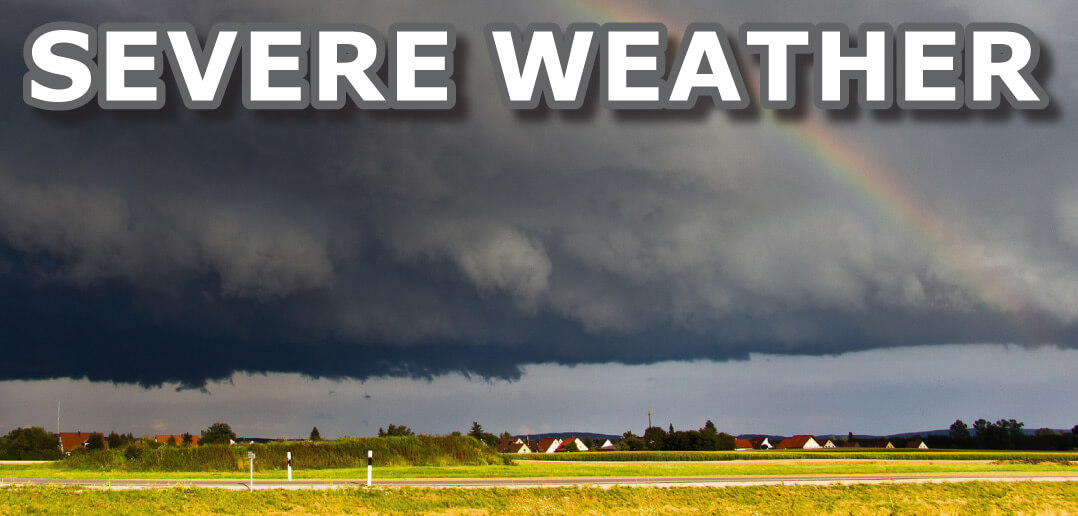Severe Weather in Omaha, NE – 2018
We’re certainly no strangers to severe weather here in the Midwest. This time of year, from hail storms and torrential downpours to high winds and tornadoes, it can get pretty dicey. As evidenced by this spring, experiencing weather extremes in a short time period is also a more frequent occurrence today, which makes it pretty hard to predict what will come next.
With the severe weather that we’ve seen in recent years across the United States and globally, it comes as no big shock that weather-related disasters are considered one of the largest risk concerns for homeowners and commercial property owners.
We’ll probably have our fair share of bad storms this year, and in the wake of those, there could easily be damage to your home or elsewhere on your property, to your vehicle, or to a commercial property you own or lease.
For homeowners, now is a good time to review your homeowners insurance to be sure you have adequate coverage. Your agent will be able to help you identify any areas of concern that are relevant to you.
For example, it’s a common misconception that flood insurance is included in any homeowners insurance policy when that isn’t always the case. It may need to be purchased separately. There may be a waiting period before coverage starts, so if a storm is approaching, it may be too late to purchase that type of supplemental insurance coverage. Since we do experience flash flooding here from time to time, it’s wise to talk to your agent about it.
The same holds true for auto insurance; it’s important to be aware of the coverage your policy provides.
“For vehicles, it’s really very simple – you either have full coverage insurance or you don’t,” says Grant Mussman with State Farm Insurance. “Let’s say your car is completely demolished, which was the case for a lot of vehicles in the wake of the Blair hailstorm in 2014. If you have a full coverage policy, you won’t shoulder the burden of paying the cost of the repair work, just the deductible. If you don’t, how will you cover the cost to get your car at least drivable again if not completely restored back to its previous condition? Can you cover it out-of-pocket or do you have an emergency savings? That pretty much rounds out your options.
For homeowners insurance, similarly, does your policy pay for replacement of your roof or is the claim value based on depreciation? Almost always the correct selection is coverage of the full replacement of the roof minus your deductible. On the topic of roof replacement, if you need to have that done, ask about the option of impact-resistant shingles. Similar to various incentives for energy-efficient home upgrades, many insurance companies including mine offer discounts for homeowners who opt for those during a roof replacement or installation of a new roof. Request an estimate that includes impact-resistant shingles and one without and get in touch with your agent to discuss your options.
For any type of insurance you’re considering, my recommendation is to pick an agent to work with who will answer your questions when they come up. By working with someone who is responsive and also local, the process of resolving a situation that needs immediate attention goes much more smoothly. You’ll have someone here locally to hold accountable and who has a stake in maintaining his or her reputation here in the community based on the level of service provided.”
Hail is indeed a major culprit of varying degrees of damage caused to personal property, totaling more than $1 billion each year.
For damage to your vehicle, the cost of repair or the value if totaled will typically be covered by your auto insurance policy, but not always. If you carry comprehensive coverage, you’re highly likely to be financially safeguarded while if you have the basic auto liability coverage, that won’t be the case.
If you’re the unfortunate victim of hail damage to your vehicle and a trip to the body shop to get it repaired is in your future, it’s important to remember that you can select whichever one you feel most comfortable with to get the job done.
“If your repairs involve an insurance claim or someone else is paying for the repair; select a repairer of your choosing!” emphasizes Boyd Dingman with Dingman’s Collision Center. “Do not allow the insurer to choose one for you. Nebraska state laws agree: It’s your vehicle and your choice of repairer.
Choosing a reputable repair facility that will work for you and your best interests will most always lead to a positive experience. Start shopping for a repair facility before you need one; you can make better decisions when you are not rushed or in a panic. Ask friends, family, and associates for their recommendations. Even in this modern high-tech era, old-fashioned word-of-mouth reputation is still extremely valuable.
Always try to visit the shop before making the decision on who will repair your vehicle. Look for a neat, well-organized facility with modern equipment. Most vehicle manufacturers recommend specific repair procedures and equipment for the repair of their vehicles. Ensure that the facility you choose is trained in these procedures and has the proper equipment. Look for signs of professionalism in the customer service area: civic and community service awards, memberships in local and national industry organizations, Better Business Bureau signage, customer service awards, etc. Ask if the staff is technically trained and competent, expect to see certificates including vehicle manufacturer training, paint manufacturer training, training from I-CAR (the Inter-Industry ASE Conference on Auto Collision Repair, and certifications—a national standard of technician competence issued by the non-profit National Institute for Automotive Service Excellence (ASE).
We take great pride in our reputation as Omaha’s most trusted repair facility, offering our community honest, appropriate and timely repairs with unparalleled service.”
As for a storm that’s caused damage to your home, it’s equally important to select a contractor to perform the repairs who you can trust and has a good reputation locally.
In the wake of a bad storm that’s caused serious damage to properties in your area, if you find yourself as one of those property owners who will be needed the services of a contractor, again, beware of “storm chasers.”
These are people who present themselves as experienced contractors representing a company you’ve likely never heard of from out of the market who blanket the area with the sole intention of profiting as much as possible off of the situation using any means possible without any regard for the best interests of the property owners. Be careful, because sometimes they may actually pick a name that seems familiar in the community, too. Scams that have been documented included tactics like using what appears to be a local name – here that might be something that includes “Big Red” or “Heartland’s Finest.” This causes confusion because there are many established companies with upstanding reputations that have very similar names, so they blend in. Likewise, they may alter an established business name slightly, like “Striking Business,” counting on people not taking a closer look to realize it’s not “Strictly Business.”
It’s also important for businesses to beware of storm chasers who try to strike temporary partnership deals. You may have someone stop by and offer to do significant advertising of the company in exchange for a share of the business it brings in. It may seem like a great deal to pay nothing to get your name out there on the radio and on billboards, but when all is said and done, it can end up destroying the reputation of the company if the work is done poorly. At the end of the day, they will also be the ones who remain in the market where the customers are and are left on the hook for any follow-up work that’s required resulting from the use of cheap materials and shoddy repairs.
Storm chasers will come right to your door to solicit your business, using high-pressure sales tactics to get you to sign agreements or to let them perform an inspection.
Most commonly occurring, if allowed to replace your roof, you’re in real trouble for a host of nightmarish reasons including cheap materials, poor workmanship, no warranty, or being completely scammed for money up front with no work performed at all.
Be sure to do your research and select an established company; one that’s local is ideal. Also, check out their rating with the Better Business Bureau, online reviews, references, etc. Call your insurance company first to have an estimator come out and validate any suspected damage. Then, once your insurance company has validated damage and given you a quote, you can reach out to a reputable contractor and schedule an appointment with them to get an estimate, which is generally free. That company should be able to explain all of the details thoroughly in person, will be there for you every step of the way during the process, and will still be there if you need them in the future.
Hopefully we won’t have much to worry about in the way of damage caused by severe weather this year. However, that’s probably wishful thinking, so just to be on the safe side, be prepared accordingly. By utilizing the knowledge, experience, and services of our local professionals, you’ll be in good hands.



